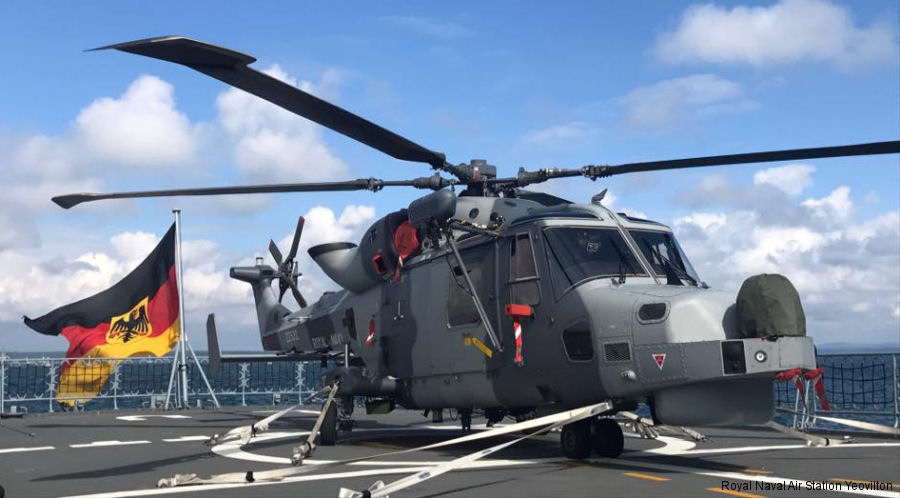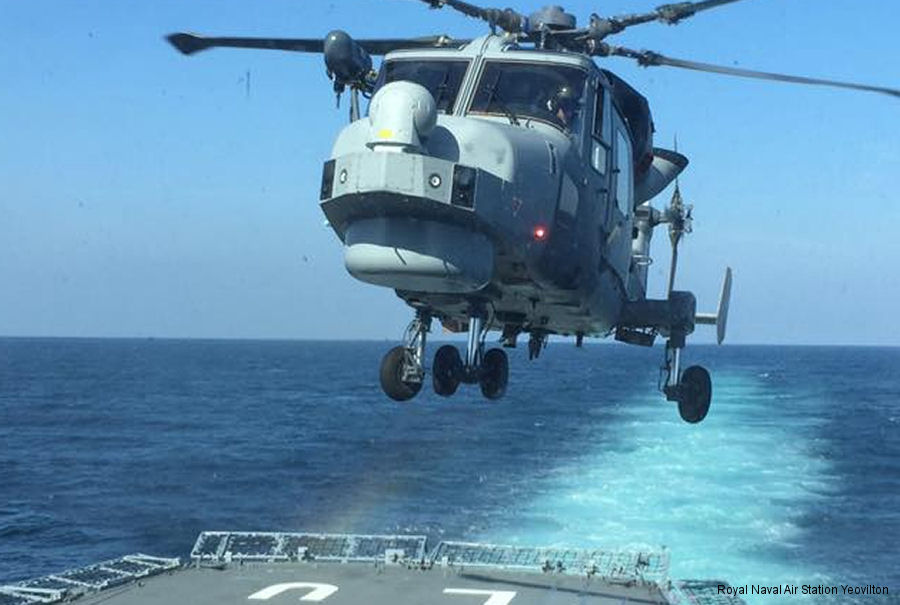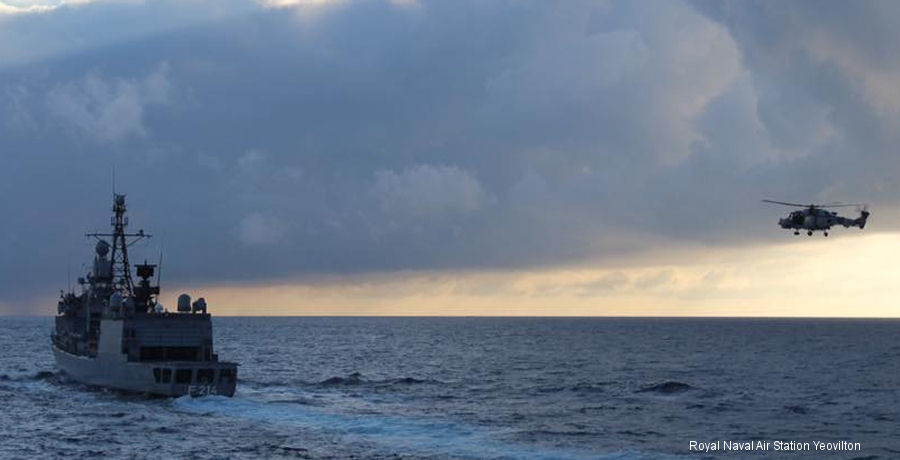Royal Navy, July 14, 2017 - The Fleet Air Arm’s newest helicopter has proved it can deploy with the German Navy after seven weeks’ intensive training embarked in the frigate Lübeck.
A Wildcat helicopter from RNAS Yeovilton joined a German warship throughout its pre-deployment training – the first time the Royal Navy’s newest operational helicopter has embarked with any foreign vessel.
When the German Navy’s Lynx started to have problems they looked too their allies for assistance and 815 Naval Air Squadron (NAS) offered one of its Wildcat helicopters as a replacement.
Only one of the 11-strong team of fliers and engineers was a natural linguist. The rest underwent three hours of German lessons a day for five months (‘Operation Language Barrier’) – all while the aircrew were learning to convert from the Lynx to the Wildcat – before joining the Lübeck.
The Wildcat Flight then spent the winter at the German Navy’s Nordholz air base (their counterpart to RNAS Yeovilton) and Wilhelmshaven (Germany’s Portsmouth) where Lübeck is based to get their first taste of working directly with the Deutsche Marine.
At the end of April 213 Flight were finally ready to join their ship as it went through Operational Sea Training – provided by the Royal Navy off Plymouth.
They found the Lübeck’s flight deck “perilously narrow”, but still not as tight a fit as the hangar; the helicopter squeezed in with just 15 centimetres to spare at the nose and tail.
Frigate and helicopter then went through the rigours of training – fighting fires, fending off air and submarine attacks, responding to disasters ashore, carrying out escort duties and much more, interspersed with quieter weekends when the German Matrosen (matelots) introduced the Brits to the concept of Einlaufbiers – parties which began as soon as each week’s training ended.
Fregattenkapitän Matthias Schmitt, Lübeck’s Commanding Officer, said together the Brits and Germans made “a really great team that I can rely on”… after a few initial language difficulties.
The most common phrase over the loudspeakers throughout training: Achtung, Wildkatze! Action Wildcat!
“Our German adventure has been an enormous challenge" said 213 Flight Commander Lt Oliver Brooksbank.
“We've proven that we can operate a brand new helicopter in a different language on a foreign ship – and do it as effectively as on board a Royal Navy ship. Wildcat and Lübeck were entirely integrated, compatible, and ready for further NATO tasking.
“Zwei Marinen, eine Mannschaft – two navies, one crew – has been our mantra for the whole mission, and wherever the Royal Navy sends us, we hope to work with the German Navy along the way.”
A Wildcat helicopter from RNAS Yeovilton joined a German warship throughout its pre-deployment training – the first time the Royal Navy’s newest operational helicopter has embarked with any foreign vessel.
When the German Navy’s Lynx started to have problems they looked too their allies for assistance and 815 Naval Air Squadron (NAS) offered one of its Wildcat helicopters as a replacement.
Only one of the 11-strong team of fliers and engineers was a natural linguist. The rest underwent three hours of German lessons a day for five months (‘Operation Language Barrier’) – all while the aircrew were learning to convert from the Lynx to the Wildcat – before joining the Lübeck.
The Wildcat Flight then spent the winter at the German Navy’s Nordholz air base (their counterpart to RNAS Yeovilton) and Wilhelmshaven (Germany’s Portsmouth) where Lübeck is based to get their first taste of working directly with the Deutsche Marine.
At the end of April 213 Flight were finally ready to join their ship as it went through Operational Sea Training – provided by the Royal Navy off Plymouth.
They found the Lübeck’s flight deck “perilously narrow”, but still not as tight a fit as the hangar; the helicopter squeezed in with just 15 centimetres to spare at the nose and tail.
Frigate and helicopter then went through the rigours of training – fighting fires, fending off air and submarine attacks, responding to disasters ashore, carrying out escort duties and much more, interspersed with quieter weekends when the German Matrosen (matelots) introduced the Brits to the concept of Einlaufbiers – parties which began as soon as each week’s training ended.
Fregattenkapitän Matthias Schmitt, Lübeck’s Commanding Officer, said together the Brits and Germans made “a really great team that I can rely on”… after a few initial language difficulties.
The most common phrase over the loudspeakers throughout training: Achtung, Wildkatze! Action Wildcat!
“Our German adventure has been an enormous challenge" said 213 Flight Commander Lt Oliver Brooksbank.
“We've proven that we can operate a brand new helicopter in a different language on a foreign ship – and do it as effectively as on board a Royal Navy ship. Wildcat and Lübeck were entirely integrated, compatible, and ready for further NATO tasking.
“Zwei Marinen, eine Mannschaft – two navies, one crew – has been our mantra for the whole mission, and wherever the Royal Navy sends us, we hope to work with the German Navy along the way.”
See also |
AW159 Wildcat HMA2 in
815 NAS







